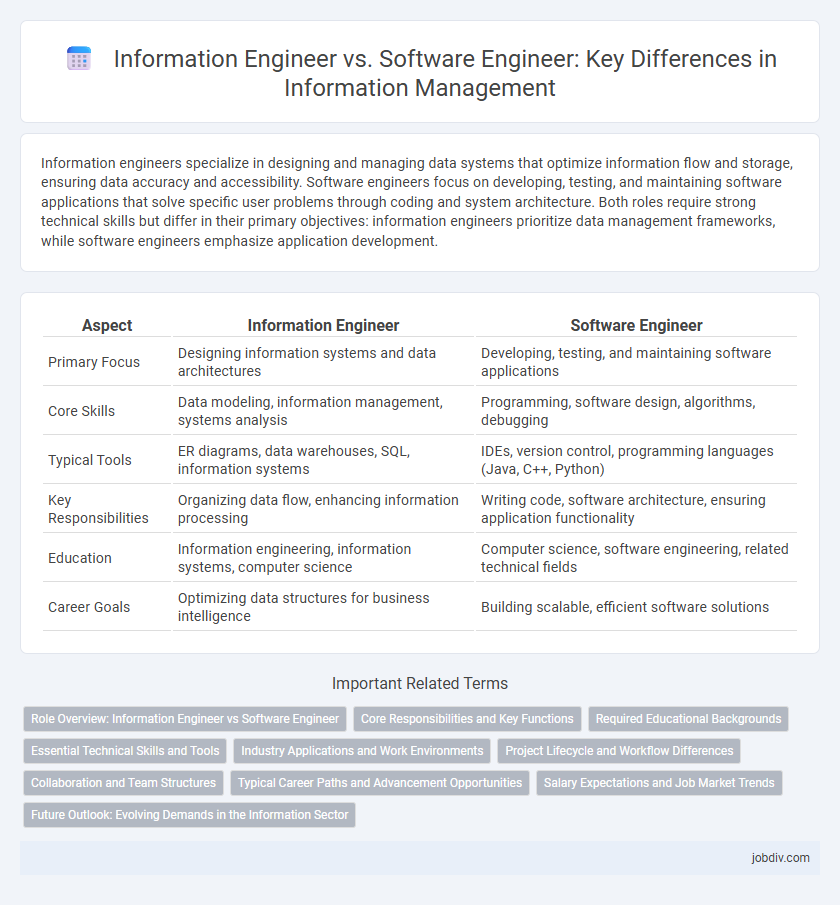Information engineers specialize in designing and managing data systems that optimize information flow and storage, ensuring data accuracy and accessibility. Software engineers focus on developing, testing, and maintaining software applications that solve specific user problems through coding and system architecture. Both roles require strong technical skills but differ in their primary objectives: information engineers prioritize data management frameworks, while software engineers emphasize application development.
Table of Comparison
| Aspect | Information Engineer | Software Engineer |
|---|---|---|
| Primary Focus | Designing information systems and data architectures | Developing, testing, and maintaining software applications |
| Core Skills | Data modeling, information management, systems analysis | Programming, software design, algorithms, debugging |
| Typical Tools | ER diagrams, data warehouses, SQL, information systems | IDEs, version control, programming languages (Java, C++, Python) |
| Key Responsibilities | Organizing data flow, enhancing information processing | Writing code, software architecture, ensuring application functionality |
| Education | Information engineering, information systems, computer science | Computer science, software engineering, related technical fields |
| Career Goals | Optimizing data structures for business intelligence | Building scalable, efficient software solutions |
Role Overview: Information Engineer vs Software Engineer
Information Engineers specialize in designing and managing data architecture, ensuring efficient data flow and integration across systems to support business intelligence and analytics. Software Engineers focus on developing, testing, and maintaining software applications by writing scalable code and implementing algorithms tailored to user needs. Both roles require strong problem-solving skills, but Information Engineers emphasize data modeling and system interoperability, while Software Engineers concentrate on software development lifecycle and application performance.
Core Responsibilities and Key Functions
Information Engineers specialize in designing, managing, and optimizing data systems to ensure effective information flow and integrity across an organization, focusing on database architecture, data modeling, and information lifecycle management. Software Engineers develop, test, and maintain software applications and systems, emphasizing coding, software design, debugging, and performance optimization. While Information Engineers prioritize data accuracy and accessibility, Software Engineers concentrate on creating functional, user-centric software solutions through programming and system integration.
Required Educational Backgrounds
Information Engineers typically require a degree in information systems, computer science, or applied technology with a focus on data management and systems analysis. Software Engineers often hold degrees in computer science, software engineering, or related fields emphasizing programming, algorithms, and software development life cycles. Both roles benefit from certifications in specific technologies but differ in their foundational educational focuses, with Information Engineers leaning towards integrating information technology with business processes.
Essential Technical Skills and Tools
Information Engineers excel in data modeling, database management, and systems analysis, utilizing tools like ERwin, SQL, and data warehousing platforms to design efficient information systems. Software Engineers focus on software development, mastering programming languages such as Java, Python, and C++, along with integrated development environments (IDEs) like Visual Studio and debugging tools. Both roles require strong problem-solving skills, but Information Engineers emphasize data architecture while Software Engineers prioritize application coding and software lifecycle management.
Industry Applications and Work Environments
Information engineers primarily focus on designing and managing data systems, optimizing information flow in industries such as telecommunications, healthcare, and logistics, where accurate data processing is critical. Software engineers develop software applications for diverse sectors including finance, gaming, and e-commerce, working in environments that emphasize coding, software architecture, and system integration. Both roles require collaboration within cross-functional teams, but information engineers are often embedded in data-centric projects, while software engineers are more involved in application development cycles.
Project Lifecycle and Workflow Differences
Information engineers emphasize data modeling, system architecture, and information flow analysis throughout the project lifecycle, ensuring that data integrity and accessibility align with organizational needs. Software engineers focus on coding, debugging, and software deployment, following development methodologies like Agile or Waterfall to manage the software build and release process. Workflow differences arise as information engineers prioritize requirements gathering and system design phases, while software engineers concentrate on implementation and testing stages.
Collaboration and Team Structures
Information engineers and software engineers collaborate within cross-functional teams where clear communication and shared understanding of system requirements are essential for project success. Information engineers focus on data architecture and integration, enabling software engineers to build scalable applications based on well-structured information models. Agile team structures promote iterative feedback, allowing both roles to align technical solutions with business objectives effectively.
Typical Career Paths and Advancement Opportunities
Information engineers often start in data architecture or systems analysis roles, progressing to senior information management or enterprise architecture positions. Software engineers typically begin as junior developers, advancing to senior developer, software architect, or engineering manager roles. Career advancement for both involves specialization, leadership opportunities, and continuous skill development in emerging technologies.
Salary Expectations and Job Market Trends
Information Engineers typically command salaries ranging from $75,000 to $120,000 annually, driven by their expertise in data integration and systems optimization, while Software Engineers earn between $85,000 and $130,000, reflecting strong demand in application development and cloud computing sectors. Job market trends reveal a steady growth rate of 15% for Software Engineers through 2030, fueled by expanding digital transformation initiatives, whereas Information Engineers see a niche but rising demand in industries prioritizing big data analytics and infrastructure efficiency. Salary expectations correlate closely with regional tech hubs, experience levels, and specialization areas, making continuous skill advancement crucial for both roles in a competitive technology job market.
Future Outlook: Evolving Demands in the Information Sector
Information Engineers are increasingly vital as data analysis and management become central to business strategies, driving demand for expertise in information architecture and database optimization. Software Engineers continue to experience strong growth, especially with the rise of artificial intelligence, cloud computing, and cybersecurity, requiring advanced programming and system design skills. Both roles are evolving rapidly, with Information Engineers focusing more on integrating big data solutions, while Software Engineers adapt to creating scalable, secure software in an increasingly interconnected digital landscape.
Information Engineer vs Software Engineer Infographic

 jobdiv.com
jobdiv.com